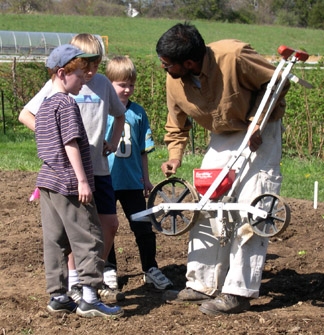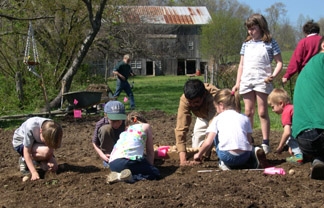Keep Farming First
By Colleen Cranney
West Chester University was the site for an inspirational two-day conference entitled Keep Farming First on January 9-10, 2003. Co-sponsored by Chester County 2020 Trust, the Chester County Economic Development Council, and Penn State College of Agricultural Sciences Cooperative Extension, the two days consisted of stimulating presentations by those who are most familiar with the challenges that face our farmers today. Approximately 300 people, many of them Chester County farmers, came out to attend workshops addressing things like estate planning, environmentally sound farming practices, direct marketing opportunities, agricultural law, biotechnology, and the agricultural land preservation program. Dawn Lawless and Paul Morgan presented a workshop on promoting agricultural awareness in the schools, Brian Moyer (who provides Maysie's Farm with chickens and eggs) presented on starting a farmer's market, and Sam Cantrell ran a workshop about starting a CSA. Fred Kirschenmann, Director of the Leopold Center for Sustainable Farming, gave a compelling talk about reinventing agriculture, and Chester County Century Farmers were honored.
Here are some impressions taken from the conference:
From Louise Smith:
What made a big impression on me is that there are a number of farmers of all ages in Chester County who had not ever met one another until coming to the Keep Farming First conference. They learned about one another's farm operations and were exposed to new options such as producer-only farm markets, CSAs, and other direct marketing opportunities. It is clear to me that Chester County's farmers need to network more as well as have their collective voices heard with the help of the Chester County 2020 Trust, the Countryside Exchange, and other agricultural committees and venues.
From Cathy Fornwalt:
One breakout session I attended was titled "Environmentally Sound Farming Practices." The three-person panel included people from the Natural Lands Trust, the Chester County Conservation District and the Natural Resources Conservation Service. They discussed services available for farmers to help reduce soil erosion and enhance water quality. In addition to providing written information these agencies can provide one-on-one technical assistance or have cost-share to help implement practices. Some areas discussed included crop residue management, contour farming, conservation buffers, especially riparian forest buffers, crop rotation, integrated pest management and terraces and diversions. It was amazing to me to hear the enormous scope of services available to the area farmers, and to experience the intensity of the representatives' interest in helping to enhance sustainability.
Another breakout session I attended was titled "The Countryside Exchange-Recommendations for Sustaining Agriculture in the Region." The panel members included a township supervisor, a financial planner, a dairy farmer and a community representative from southern Chester County. We all had to introduce ourselves, and I was the only one there without a title or a farm, but I was welcomed. Many farmers in this session did much networking and seemed to be beginning to work toward more cooperative efforts in many areas. Many seeds seemed to be planted in this session.Ê They discussed possible ways of bridging the gap between developments and farms, of integrating newcomers with the farmers, of facilitating hedgerows between farms and adjacent developments to help protect both the children at play and sometimes the Amish children at work in the fields (with mules being spooked by dirtbikes, etc.). They discussed the advantages of having a farmer or two on township boards. It was a session that seemed too short, but seemed to have begun dialogues that would continue beyond the confines of this one session.
From Paul Morgan:
The Keep Farming First conference formally opened at 10:00am on January 9th in the Sykes Union auditorium at West Chester University. By 11:15 we had heard revolving remarks at the podium from seven (yes, 7) dignitaries, including brief relief from stand-up politician Andy Dinniman. According to the agenda — which I had carefully read by then — the Breakout Sessions were supposed to begin, but the morning Keynote speaker had not even been introduced yet! Fortunately, the organizers played it cool, rearranged the schedule, and brought on the Director of the Leopold Center for Sustainable Agriculture, Fred Kirschenmann. He was worth the wait. Fred grabbed the microphone off the podium and peered out at us from the front of the stage, teeth slightly akimbo. Sustainable agriculture is about making connections — people, land, community — and Fred did that with a wonderfully integrated audience of conventional farmers, economic developers, biodynamic devotees, and conscious eaters. His message of ecological, economic, and social realities was a refreshing change from the platitudes and slogans that were pitched to please all. Agriculture has to change and Fred Kirschenmann had the charts, graphs, experience, wardrobe, and integrity to make the case. Anyone who farms and stewards 3,500 acres in North Dakota can command attention. And so it went with the remainder of the conference, which was, contrary to my expectations, an inspiring event. Sustainable agriculture had made it to center stage, and the audience consisted of more than the choir.
Paul's ruminations on lunch: West Chester University's food service vendor, Aramark, has right of first refusal on all events held on campus. For a conference featuring the joys of local food, it was an unfortunate irony that the noon meals were over-packaged executive lunches in a bag. It was a reminder that there is much work to do in our own homes and in the institutions where we work. Walking the talk may not be the right message for agriculture in Chester County. I propose a campaign that features the following: Buying Local in Chester County — We Butter What We Utter, and We Chew What We Spew. Just a thought.
We Need You!
By Colleen Cranney
Returning CSA members know that things run more smoothly when there's a person in the barn at pick up times to help keep the bins stocked, remind people to sign in, point members towards the pick-your-own beds, and answer questions. Although they have the rather imposing title of Distribution Managers, these are simply members who are volunteering a little bit of extra time at the farm. And to keep things running smoothly, and to cover all the distribution hours, WE NEED MORE VOLUNTEERS! This is a great way to learn more about the vegetables youÕre getting and also to get to know the interns and other CSA members. Anyone can do it — no experience necessary — and we will work around the hours you are available. If you are even remotely interested in this, sign up at the New Member Orientation meeting (Wednesday, May 21), call Colleen at 610 594-7751, or just talk to the Distribution Manager when you come in to pick up your vegetables.
And on the subject of volunteering, there are always opportunities to help in the garden (remember the weeds?). Our most urgent need is to get some help with mowing. The interns donÕt seem to appreciate what a fun, relaxing, and fulfilling job it can be! If you think you can help with this, contact Sam at 610 458-8129.
|
New Farm Manager
by Colleen Cranney
There's a welcome new addition at Maysie's Farm this year — Sharat Somashekara has been hired as the new farm manager. He will be overseeing the day-to-day farm operation, managing the interns, and making everything run more smoothly. Already he's been busy with seed ordering, planning, and acclimating himself to his new environment.
Sharat is a man of many interests. He is an accomplished saxophonist and has recently taken up guitar. He is a committed student of yoga. A native of Bergen County, New Jersey, he graduated from NYU with a degree in math and computer science and did some work in web design. But farming is in his blood — his maternal grandfather was a farm manager in southern India — and after college he went to the University of California at Santa Cruz for a six- month agroecology apprenticeship. In his time there, he learned a lot about fruit and vegetable growing, and realized he wanted to pursue farming.
 Sharat comes to us most recently from Accokeek Farm, a CSA located in Maryland across from Mt. Vernon. He apprenticed under Shane Labrake, who has been turning conventionally farmed tobacco fields into an organic, mixed vegetable operation. Sharat had a great experience there, and is anxious to apply his knowledge at Maysie's. Sharat comes to us most recently from Accokeek Farm, a CSA located in Maryland across from Mt. Vernon. He apprenticed under Shane Labrake, who has been turning conventionally farmed tobacco fields into an organic, mixed vegetable operation. Sharat had a great experience there, and is anxious to apply his knowledge at Maysie's.
Sharat is excited about the extremely rich soil we have here, a contrast to what he worked with in Maryland. He's anxious to start "digging in!" After his first few months of planning, preparing, and acquiring a work force of interns, he's looking forward to working the beds and seeing the results of his hard work. His goal for the season is to deliver high-quality, consistent products every week. He's enthused about promoting local agriculture, and being a part of a place that people look forward to coming to each week.
PAEE Conference Highlights
by Colleen Cranney
"Sowing the Seeds for Change Through Environmental Education" was the theme for this year's annual meeting of the Pennsylvania Alliance for Environmental Education. Approximately 200 educators from around the state met at the Lancaster Host Resort on November 14-17, 2002 for what turned out to be a most informative and interesting weekend. Maysie's Farm was a presence throughout the weekend: volunteer extraordinaire Dawn Lawless helped organize the conference and presented a workshop on school gardens, Paul Morgan led a workshop on the role of meditation in environmental education, and Sam Cantrell presented a workshop on CSAs. In addition, Maysie's Farm Conservation Center sponsored keynote speaker Dr. John Ikerd.
Friday of the conference was devoted to field studies. Attendees had a choice of about a dozen different day trips ranging from a tour of a solid waste disposal system to an Amish Farm tour. Friday evening's keynote speaker was Dr. Daniel J. Phillipon who spoke about the history of environmentalism. The PAEE 25th Anniversary dinner was followed by entertainment by the Westmont Theater Company, featuring a great play about the life of William Bartram.
On Saturday and Sunday there were over 30 workshops offered. Many of the workshops addressed the new environmental education standards that must be implemented in public school classrooms. The workshops I attended were extremely informative and well presented. All provided handouts, practical applications and lots of teaching tips. I feel much more informed about school gardens, biodiversity, plant pathology and nature in the Delaware Valley than I did before the weekend. My biggest regret is that I couldn't attend more workshops. I would have enjoyed the one on composting, or amazing insects, or propagation...!
The keynote speakers were inspirational as well. Dr. John Ikerd presented a strong case for the necessity of sustainable agriculture to ensure a healthy future for the Earth and its people. Dr. Ilka List stressed the important role of outdoor learning in the cognitive and emotional development of children.
Saturday included PAEE regional meetings, and there was an exhibit room and silent auction open all day. An awards banquet was held Saturday night, followed by entertainment featuring Caribbean Rhythms. Not only was it a weekend full of learning opportunities, but a chance to associate with other people interested in the environment. I think all the participants came away from the conference with a renewed sense of purpose and eagerness to share our love of the environment with others.
For more information about PAEE, go to their website at www.paee.org.

Sharat Somashekara, our Farm Manager, planting with children at the Growing Families, Growing Gardens workshop on Sunday, April 27th.
|



